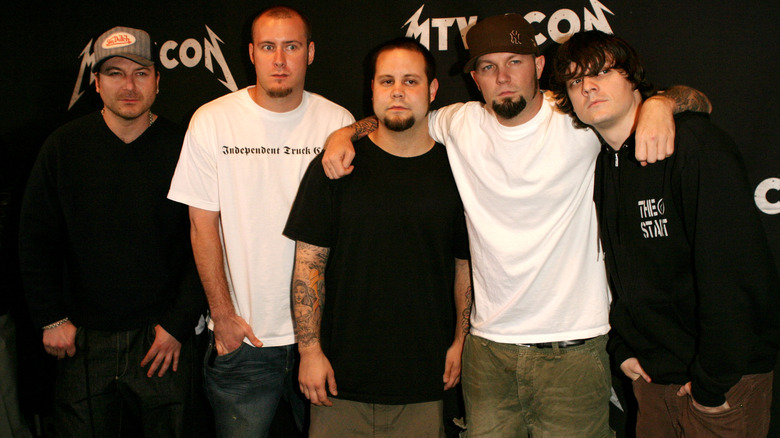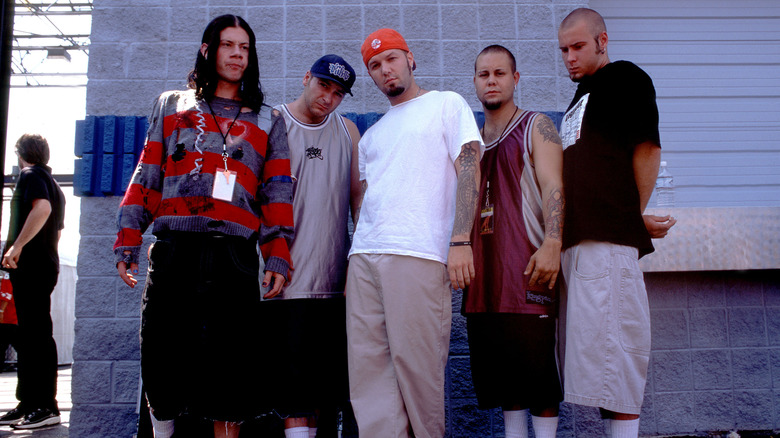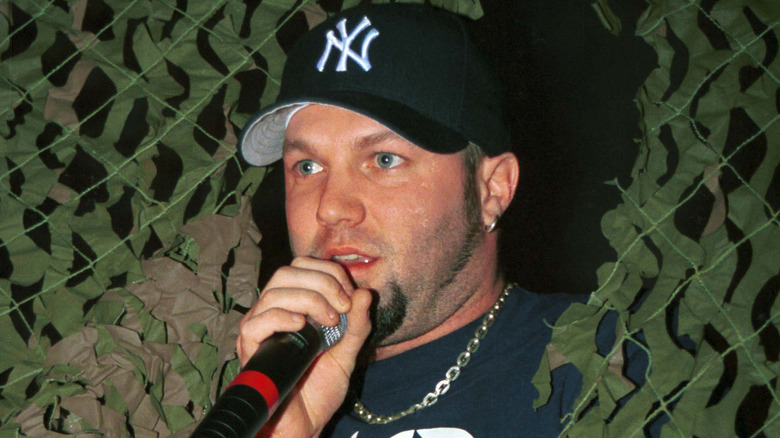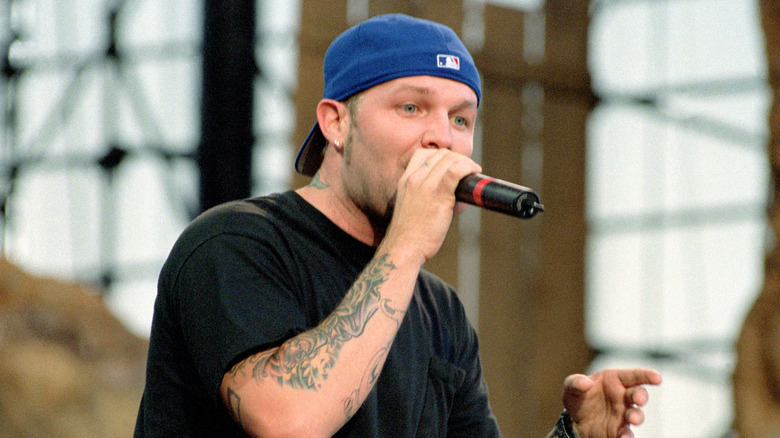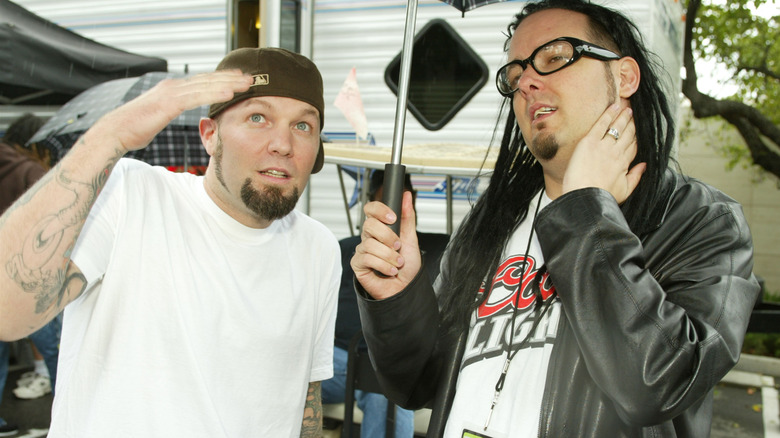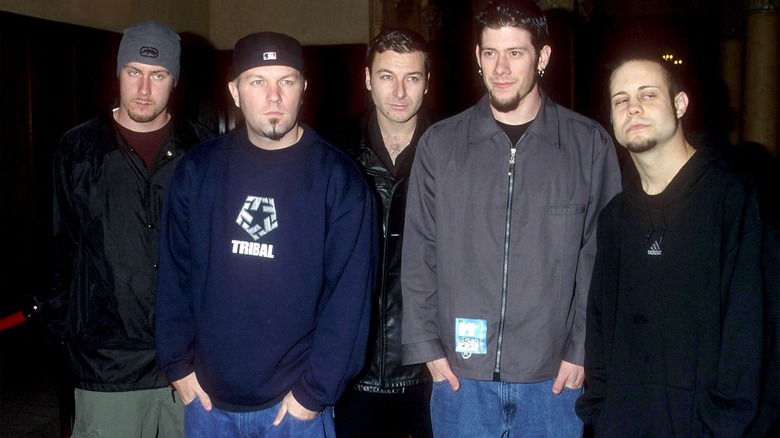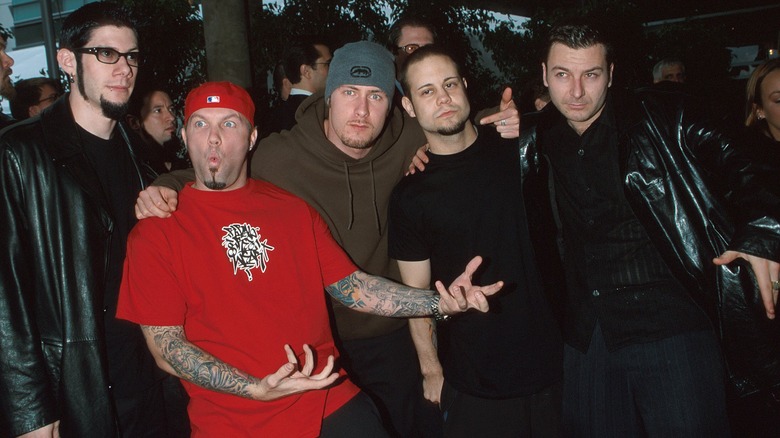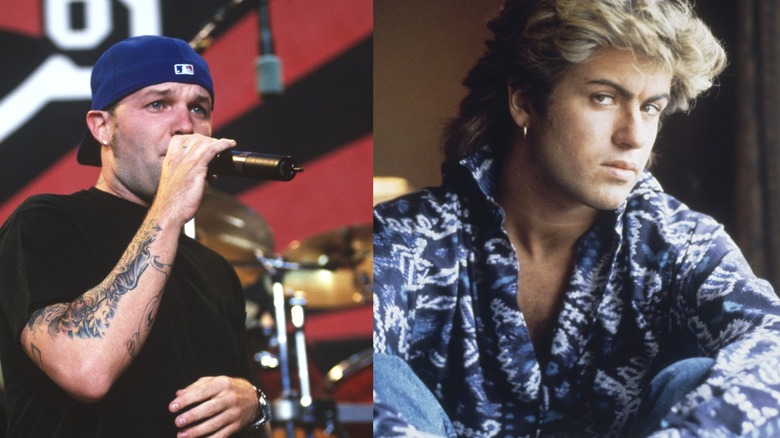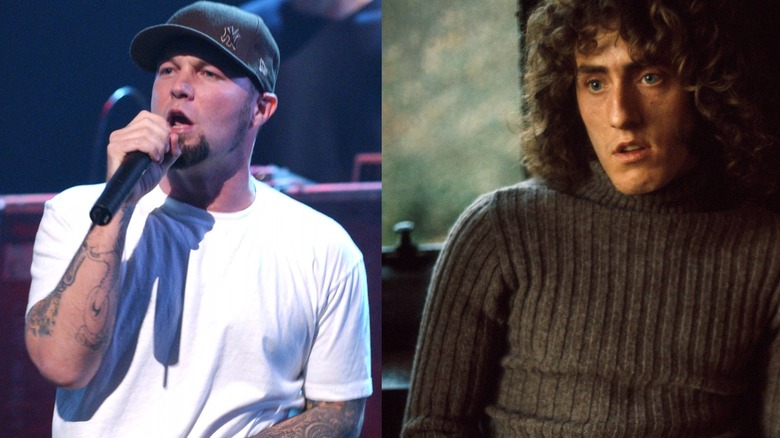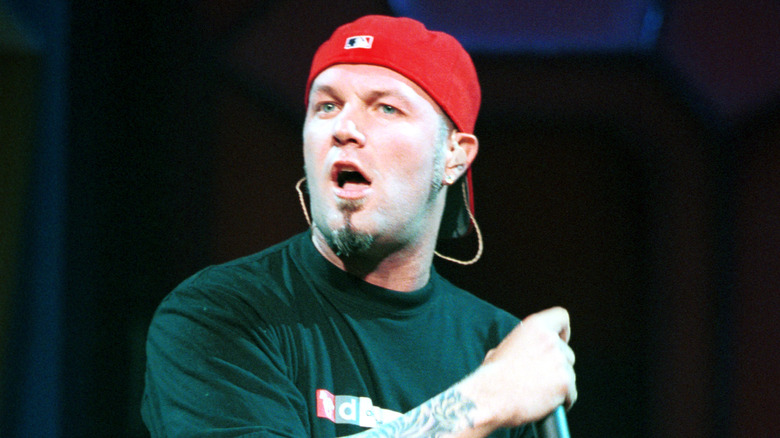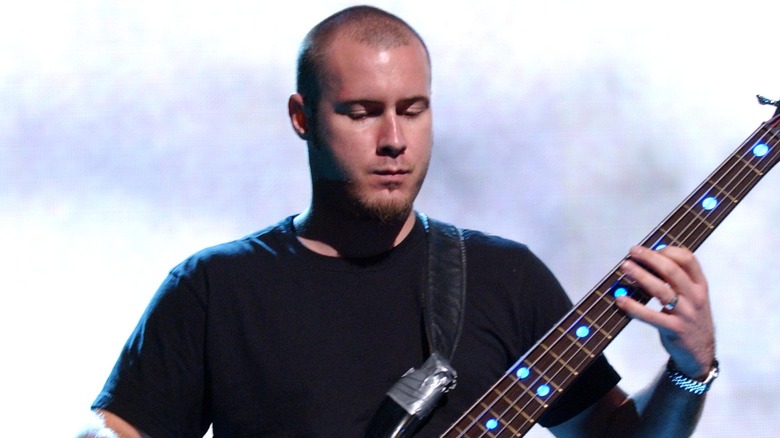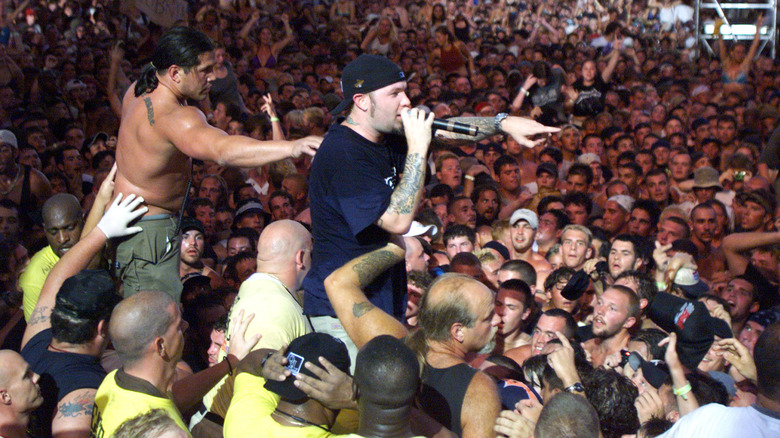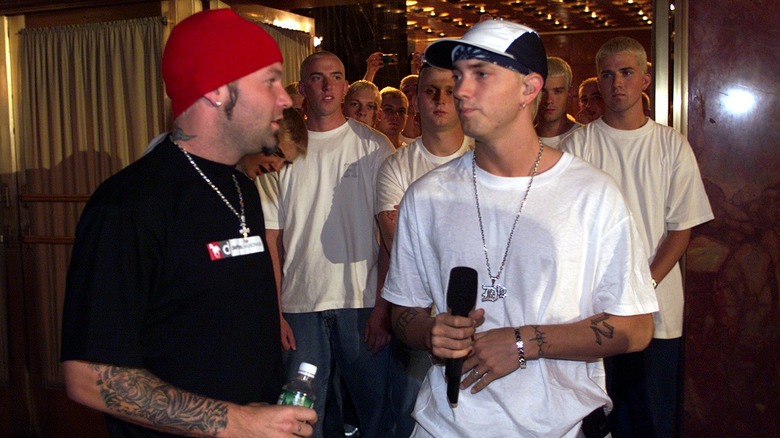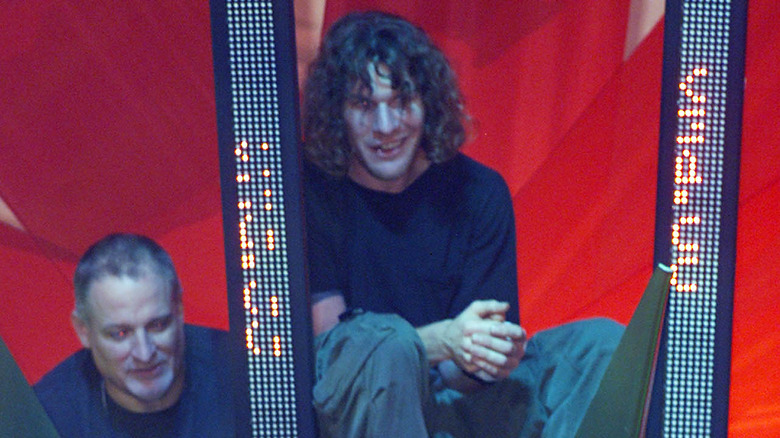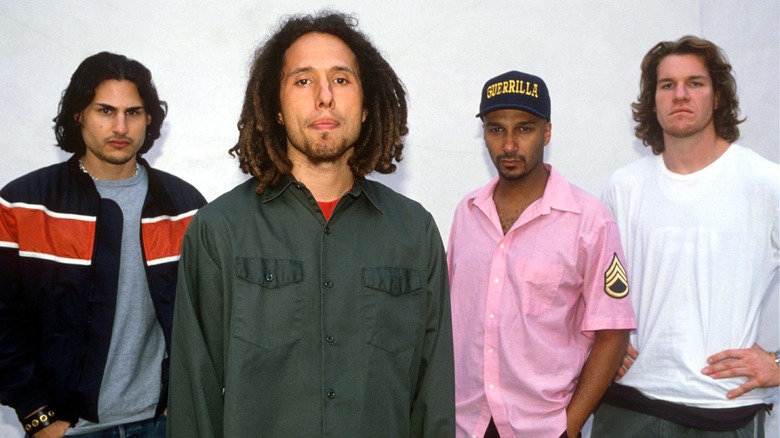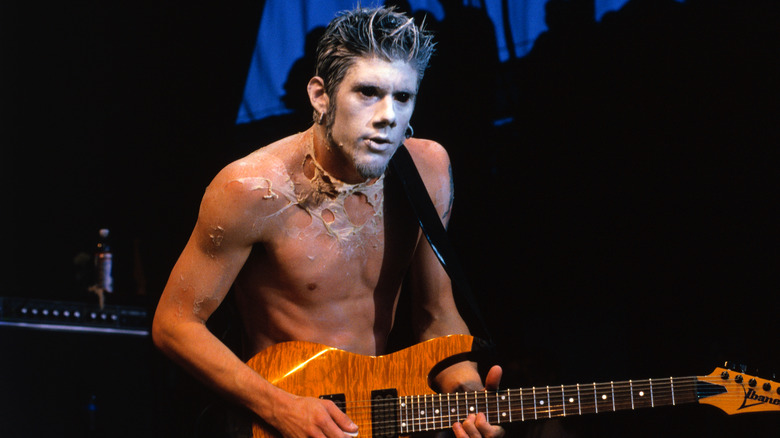How Limp Bizkit Became One Of The Most Hated Bands In Music
The late 1990s were an edgy time to be a pop culture consumer. The then-WWF's Attitude Era introduced more mature themes to the once kiddie-friendly professional wrestling scene. The adult animated series "South Park" shocked moral guardians with its basic concept — four foul-mouthed third-graders (later fourth-graders) and their wacky misadventures in a small Colorado mountain town. And over in the world of music, nu-metal took over as the most popular sub-genre of rock, with dozens of angry young bands emerging from obscurity in various parts of the world, including Jacksonville, Florida's very own Limp Bizkit.
Made up of lead vocalist Fred Durst, guitarist Wes Borland, bassist Sam Rivers, drummer John Otto, and turntablist (and House of Pain alumnus) DJ Lethal, Limp Bizkit had numerous rock hits in the late '90s and early 2000s and headlined huge music festivals such as Woodstock '99 as one of the biggest musical acts of their time. But while the Attitude Era is seen as an extremely important and influential timeframe in wrestling history and "South Park" remains popular and socially relevant as it creeps toward its third decade on TV, Limp Bizkit is still looked at with mockery and remains the object of disdain for many a music fan. In fact, that's nothing new for the band, which has been drawing derision from critics and/or listeners almost from the moment they formed. But how did they become so disliked in the first place?
About that band name ...
The long-running idea that Limp Bizkit is a band of grown men who haven't gotten over their teenage edgelord phase can be traced right back to their band name — definitely no surprises there. Limp Bizkit is the kind of band name you can expect from a bunch of bored seventh- or eighth-graders making an unholy racket, or should we say, jamming in somebody's bedroom, but according to Fred Durst, there's a method behind such madness.
As quoted in the book "Limp Bizkit" by Colin Devenish, Durst said he chose the name because he wanted to filter out listeners who he knew would hate his band's music. "The name is there to turn people's heads away," the frontman said. "A lot of people pick up the disc and go, 'Limp Bizkit. Oh, they must suck.' Those are the people that we don't even want listening to our music."
Durst gave a slightly different explanation during a Reddit AMA, sharing how Limp Bizkit came about when the group was brainstorming band names. "I wanted it to have the same roll off of the tongue as Led Zeppelin, but be so odd that you would have a hard time forgetting it," he said, mentioning names such as Gimp Disco and a variety of other suggestions that have no place in polite conversation. "Plus, we never really took our name or purpose very [seriously] considering the chances of succeeding were slim to none at that point," Durst added.
Their first single benefited from pay-for-play tactics
Choosing a hilariously bad name to turn off unwanted listeners is one thing, but what if the plan seems to be working too well? By the start of 1998, Limp Bizkit's first album, "Three Dollar Bill Y'All," had been out for about half a year, and the band had yet to grab the attention of radio programmers. Wanting to help out the struggling rap-rockers, their label, Flip/Interscope, went to Portland, Oregon, radio station KUFO-FM in January 1998, and agreed to pay $5,000 so that they could play the song "Counterfeit" about 50 times over a span of five weeks, according to The New York Times.
That's not too many plays in the grand scheme of things, but no matter how you look at it, Flip/Interscope and Limp Bizkit were involved in a pay-to-play scheme — a legal version of the payola tactics that led to the downfall of early rock 'n' roll era DJ Alan Freed several decades prior. Instead of letting Bizkit's music do the talking, the label opened up their wallets so that a radio station could give exposure to a song reportedly deemed too heavy for its regular rotation.
Ultimately, "Counterfeit" didn't do too well on Billboard's rock charts, but Limp Bizkit's star would soon be burning brighter as the controversies surrounding the band, their lyrics, and their image kept heating up in the years that followed.
Their lyrics often tend to espouse misogynistic views
As Limp Bizkit continued to gain more traction with the release of their sophomore album, "Significant Other," in 1999, one thing became very apparent to a lot of fans and critics — some of the band's songs had some nasty lyrics directed toward women. Fred Durst addressed this issue in an interview with Rolling Stone, explaining to the outlet that Limp Bizkit's second album was, in fact, about his former significant other and the pain he felt over their breakup. "That's because I said the words w**** and b****," he said, referring to the misogyny accusations. "My whole record is about my girlfriend who put me through the [wringer] for three years and my insecurity about it. It became this big thing."
While some critics have tried to see the bigger picture when it comes to songs like "Nookie," the perceived misogynist tone of Limp Bizkit's lyrics has followed them for most of their career. Not helping is the accusation that the band comes about as hypocritical by proclaiming their love of women before performing songs with offensive language aimed at ex-girlfriends and other females. Granted, they're far from the only band or performer that has faced such accusations, but when you've got a frontman who regularly raps about doing it all for the nookie, it's hard to live down that reputation as a misogynist act.
Durst's allegedly homophobic collaboration with Korn
Despite the differences in their overall sound and lyrical content, Limp Bizkit and Korn were particularly good friends in the nu-metal scene. They were part of the same family of mad-at-my-dad rockers, so to say, with the latter band making the former a staple of its Family Values Tour. To further highlight the bond between the two acts, Fred Durst was a guest performer on Korn's "All in the Family," a track off the band's 1998 album "Follow the Leader."
Overall, "Follow the Leader" got solid reviews as the Bakersfield-based band continued its evolutionary path toward nu-metal greatness. But it was that one track with a certain Florida man on guest vocals that stuck out like a sore thumb on an otherwise strong album. As pointed out by Rolling Stone, Durst's verbal sparring with Korn frontman Jonathan Davis was laced with homophobic insults, and the inclusion of such derogatory language cheapened the fact that Davis sometimes used Korn's music to fire back at the homophobic bullies who picked on him when he was a kid.
In a 1999 interview with Rolling Stone, Durst defended his collaboration with Korn, stressing that there was no anti-LGBTQ intent in the lyrics — it was just two friends razzing each other through song. However, he also said that the controversy caused by "All in the Family" only added to Limp Bizkit's notoriety and his own, which was just fine by him. "... it's another reason to not like this obnoxious band, this guy who starts riots at shows, stage dives, pulls chicks onstage, tells promoters to kiss his a**," Durst said. "You gotta hate this guy. Well, I hope it turns into the guy you love to hate."
A lack of substance .... and authenticity?
Let's get one thing straight — you do not listen to Limp Bizkit if you're looking for a thinking man's band that sings about societal issues with nuance, well-thought-out arguments, and gravitas. Even if you take away the misogynistic and (thankfully rare) homophobic undertones from their lyrics, Limp Bizkit is a band that never pretended to reinvent the wheel with lyrical poetry. But where do you draw the line when it comes to a lack of substance in music?
While mostly giving out backhanded compliments, multiple Rate Your Music reviewers cited examples of Bizkit's lowest-common-denominator appeal, such as the song "Hot Dog" using the F-word almost 50 times and the very fact that the title of their third album, "Chocolate Starfish and the Hot Dog Flavored Water," is a reference to two kinds of human waste. "[T]hey appealed to kids, because kids are (on the whole) weak and influential, and think violence and swearing are cool," wrote reviewer ozzystylez.
On the other hand, some have questioned whether Fred Durst's supposed aggression and angst on many a Limp Bizkit song is genuine, to begin with. In his review of Bizkit's 2003 album "Results May Vary," YouTuber Luke Spencer (aka Rocked Reviews) described Durst's anger as fake and had this to say about the record's overall feel: "It's like listening to a little kid at a grocery store complaining because he didn't get the candy bar he wanted."
They perfectly fit the obnoxious frat boy trope
When talking about the type of person who listens to Limp Bizkit, there's one archetype that almost always comes to mind. That, of course, is the drunken college fraternity member who barely shows up for his classes and spends most of his time partying with his buddies and nursing hangovers in his dorm room ... or playing video games or screaming at the TV while watching sports. Various publications have compared Fred Durst and/or Limp Bizkit to frat boys not only because of their songs' lyrical content but also because of Durst's perception as an obnoxious, overly aggressive individual. That's a reputation the band hasn't been able to live down, even with everyone in Bizkit comfortably in middle age. In short, if Van Wilder was a band, his name would be Limp Bizkit.
Even Limp Bizkit's fellow musicians can't help but make that comparison. In the nu-metal episode of VH1's "Metal Evolution," Slayer guitarist Kerry King said that Bizkit's popularity was one reason why he didn't put a lot of effort into "Diabolus in Musica," his band's 1998 album. "I thought it was, was very frat boy stuff, and maybe that's why it was popular, I don't know," King said. "So Diabolus didn't get as much attention from me because, you know, we didn't stay in focus."
Their cover of George Michael's Faith took off at the worst possible time
We wouldn't blame you if you mistakenly thought Limp Bizkit had versions of Frank Sinatra's "My Way" and The Who's "My Generation" on 2000's "Chocolate Starfish and the Hot Dog Flavored Water." That's because they already had a built-in reputation as a band that wasn't above recording or performing oddball covers of unlikely songs, with their version of George Michael's 1987 hit "Faith" being one of their first prominent rock hits.
While it is, at the very most, a fun scream-along version of Michael's more sedate, '50s-rock-'n'-roll-flavored original, Limp Bizkit's "Faith" cover was released as Michael was dealing with the fallout from his arrest for public indecency in April 1998. As quoted by Metal Hammer, Fred Durst suggested that Michael's arrest might have helped "Faith" become as big as it did for Limp Bizkit. "I didn't expect him to get busted in that bathroom," the frontman said. "But his misfortune actually helped us. We couldn't have asked for more of a buzz!"
Unfortunately, Michael allegedly wasn't a fan of the "Faith" cover. In Colin Devenish's "Limp Bizkit" biography, Wes Borland was quoted as saying, "What we've heard from George Michael's people is that he hates it and he hates us for doing it." And the guitarist apparently felt the same way, as he reportedly told a Bizkit fan website that he's "totally sick of 'Faith' too."
Their Behind Blue Eyes cover might have been even worse
Limp Bizkit's "My Generation" may have been a completely different song from The Who's identically-titled classic from the mid-'60s, but strangely enough, Fred Durst and company eventually covered a song from the iconic British band on 2003's "Results May Vary." This time, Bizkit chose one of the more recognizable songs from The Who's 1971 album "Who's Next" and added their own twist to "Behind Blue Eyes."
Adding one's own twist to a classic rock staple does not automatically make the newer version a good one, and that was a sentiment shared by many a Rolling Stone reader, as the publication named it the second-worst cover song of all time based on reader votes. Much of the vitriol, however, was directed at the video, which features Oscar-winning actor Halle Berry and Durst kissing while a sampled Speak N Spell reads "Limp Bizkit" aloud. Hard to say which was the worse career move — the "Behind Blue Eyes" video or Berry's turn as Catwoman in the 2004 film of the same name.
Focusing much more attention on the song itself, Rocked Reviews commented that "Behind Blue Eyes" exposed Durst as a subpar singer (don't worry, we'll get to that soon), but likewise described the Speak N Spell audio as the thing that "really destroyed the song" while taking away all the substance and meaning from the original. And while often overlooked amid the myriad critiques against it, Limp Bizkit's version does not include the fast-paced instrumental break and refrain from The Who's original, though it's probably just as well — it isn't really a comforting thought to imagine how Durst might have transformed that section into a profanity-laced rap-metal breakdown.
Fred Durst can't sing ... or rap, for that matter
Even with all the shouting and screaming in nu-metal, it pays to at least be a decent singer and/or rapper. Unfortunately, many listeners don't see Fred Durst as being any good at those two facets as a nu-metal frontman. One need only look at the comments section of this upload of Durst's isolated vocals on Limp Bizkit's aforementioned "Faith" cover. "Fred delivers this with the gusto and confidence of a drunk groomsman," read a comment from YouTube user @VoyageOne1. Even his screaming has gotten flak from fans, as @frankzavala8605 remarked, "When hes screaming 'gotta have faith' sounds like a ["Call of Duty"] kid having a tantrum cause he lost the match." And in an article about those isolated vocals, Metal Hammer wrote that Durst's performance was "quite something," clarifying that "by 'quite something', in this instance, we mean 'bloody terrible'."
Over at Reddit, many fans mentioned Durst's supposedly subpar singing and rapping as one of Limp Bizkit's weakest points — if not the weakest. "I love LB but honestly fred is just a bad rapper and singer and really holds the band back," wrote u/Sstylo03, before acknowledging that they got into nu-metal thanks to Bizkit's hip-hop-flavored approach to heavy music. In another thread, u/JessePinkman shared similar sentiments, explaining, "Fred Durst in particular was a weak rapper with a whiny voice and a super fake tough-dude [effect]. It was well beyond the usual contempt for whoever is famous."
A waste of (almost) everyone else's talent?
It's easy to dunk on Fred Durst for his perceived lack of vocal talent. With that in mind, numerous fans feel that he is everything that is wrong with Limp Bizkit; hardly anyone has anything bad to say about most of his bandmates' musicianship.
A Reddit user made an interesting case for rewriting the Limp Bizkit story, suggesting that if they had someone else as their frontman, they wouldn't be as hated. "Fred Durst has totally robbed their place in history... his egotism may have been a draw for them at the time, but that combined with his nasally vocal style has firmly cemented their fate as douche rock," wrote the user, who specifically mentioned guitarist Wes Borland as an interesting performer.
Expounding on the original poster's point, u/finnigans_cake praised Borland for his creativity but shed more light on the rhythm section of bassist Sam Rivers and drummer John Otto. "Otto's fills are inventive and he can really groove," they continued. "Sam isn't afraid of the high register on his bass and knows a thing or two about syncing in with a kick-drum." In conclusion, the user hypothesized that Limp Bizkit would be much more beloved if they had someone like Deftones' Chino Moreno or Refused's Dennis Lyxzén singing lead.
As for DJ Lethal, many Redditors on the thread felt he was Bizkit's second-least valuable player behind Durst, but u/rreasons admitted to liking his ambient contributions to the song "Re-Arranged."
The Woodstock '99 debacle
Limp Bizkit's status as one of the purported villains of the Woodstock '99 narrative probably needs little introduction. But to sum it all up, the Florida rap-rockers are seen by many as the reason why violence and chaos replaced peace and love as the main themes of Woodstock, and that was quite evident as Fred Durst addressed the already-unruly crowd, advising them to look out for one another ... but also encouraging them to double down on the wild behavior. "People are getting hurt. Don't let anybody get hurt," he said, as quoted by Rolling Stone. "But I don't think you should mellow out. That's what Alanis Morissette had you motherf***ers do. If someone falls, pick 'em up. We already let the negative energy out. Now we wanna let out the positive energy."
What came next was utter pandemonium, and making matters worse were reports of a sexual assault taking place during Bizkit's set. Two decades later, Durst still refused to take any accountability for what happened at Woodstock '99. "It's easy to point the finger and blame [us], but they hired us for what we do — and all we did is what we do," Durst told Variety in 2019. "I would turn the finger and point it back to the people that hired us." He was talking about Woodstock '99 organizers Michael Lang and John Scher, the latter of whom singled Durst out multiple times for his words and actions at the event.
If you or anyone you know has been a victim of sexual assault, help is available. Visit the Rape, Abuse & Incest National Network website or contact RAINN's National Helpline at 1-800-656-HOPE (4673).
They've feuded with big-name rockers and rappers
Fred Durst is a man who isn't afraid to speak his mind, and as is often the case with high-profile people with such candidness in their words, he's been in his share of feuds with other artists. His beef with Slipknot frontman Corey Taylor stands out for the petty comments that started it all; during a 1999 concert, Durst purportedly told the audience that "Slipknot fans are a bunch of fat, ugly kids," and this led to an appearance on an Australian TV show where Taylor let the Bizkit singer-rapper have it. "Slipknot fans, for the most part, enjoy all kinds of music, like Limp Bizkit, maybe? So what you're basically saying is that your fans are fat, ugly kids, too?" Taylor retorted, with a horde of "maggots" vigorously encouraging their hero.
Durst isn't the only Limp Bizkit member who started a much-talked-about feud with another act. During a December 2000 appearance on MTV's "Total Request Live," DJ Lethal was asked about his former House of Pain bandmate Everlast's beef with Eminem, first expressing optimism that they'd patch things up before teasing that Everlast would "definitely win" in a hypothetical fight with the would-be Rap God. As many a rapper would do, Eminem fought back by dissing Lethal, Durst, and Limp Bizkit in song, calling them "cowards" and "sissies" (among many other unsavory things) in the lyrics of "Girls," which appeared on D12's 2001 album "Devil's Night."
Limp Bizkit upset Rage Against the Machine for best rock video at the 2000 VMAs
Although they are often filed in the same rap-rock or rap-metal category, Limp Bizkit and Rage Against the Machine are as close as you can get to polar opposites. One band specializes in juvenile jock jams, the other calls attention to police brutality, systemic racism, and other forms of social injustice. Similarly, you've got the former band releasing goofy videos with celebrity cameos, and the latter group putting out videos that are as thought-provoking as their music. At the 2000 MTV Video Music Awards, the general feeling was that Rage Against the Machine was an overwhelming favorite for best rock video with their Michael Moore-directed clip for "Sleep Now in the Fire." Instead, they lost out to Limp Bizkit's "Break Stuff," whose video followed the band's formula for mindless fun and random appearances from famous people.
Unhappy with Bizkit's unexpected win, Rage bassist Tim Commerford pulled off a wild stunt, climbing up a metal structure as Durst deadpanned, "And we got a madman" as he and his bandmates accepted their award. Commerford was soon arrested for disorderly conduct, later explaining to MTV that he "wanted to bring the whole thing down, but [the people in front of the structure] didn't move."
Appearing on Dean Delray's "Let There Be Talk" podcast in 2018, drummer Brad Wilk looked back on the incident, admitting at around the 1 hour, 53-minute mark that he and his bandmates weren't fans of Limp Bizkit and revealing that there was someone in particular who really wanted Commerford to climb the structure. "I think other people in the band were like, 'No, don't do anything.' Michael Moore says, 'Just go with it. Go with your heart,'" Wilk recalled.
RATM had to apologize for Bizkit
Perhaps not surprisingly, Limp Bizkit has often namechecked Rage Against the Machine as one of their influences. In the nu-metal episode of VH1's "Metal Evolution" series, DJ Lethal specified Rage guitarist Tom Morello as one of the people who inspired him to add a harder rock edge to his work on the turntables. "Killing in the Name" was, in fact, a concert staple for Limp Bizkit, and during one show in New York, Fred Durst said that the Rage Against the Machine song was a life-changer for him.
As evidenced by Tim Commerford's actions at the 2000 MTV VMAs, RATM didn't share the same positive feelings toward the younger band, and in a 2015 interview with Rolling Stone, the bassist expressed regret that he and his bandmates were such a key part of Limp Bizkit's musical blueprint. "I do apologize for Limp Bizkit," he told the outlet. "I really do. I feel really bad that we inspired such bulls***."
Rage Against the Machine's regret over inspiring Limp Bizkit and other nu-metal bands, however, dates further back than the time Bizkit pulled off that shocking win at the VMAs. Commenting on the mayhem at Woodstock '99, Morello lamented in an interview (via We Are the Pit) that RATM started with a goal to make meaningful music that could help fans connect with the band, only for things to fall off the rails when some of the bands they influenced emerged. "And that show became a bunch of thugs assaulting women in the pit and burning the festival to the ground. I was just looking around thinking 'Man, what have we done?" the guitarist continued.
Their search for Wes Borland's replacement was a complete debacle
Years before "Rock Star: INXS," Limp Bizkit held something comparable to a reality-based search after guitarist Wes Borland quit the group in late 2001. There was a lot of pomp and circumstance involved in the "Put Your Money Where Your Guitar Is" series of auditions at Guitar Center locations across the U.S., which saw thousands of bright-eyed musicians competing for a chance to join one of the hottest bands in the country. Unfortunately, multiple hopefuls complained about waiting in line for hours and only getting less than a minute to show off their skills. It didn't help that they were asked to sign waivers allowing Limp Bizkit to use their images in a potential documentary.
Reacting to the furor over the chaotic audition process, Fred Durst issued a statement on Limp Bizkit's official website (via Entertainment Weekly) where he essentially lashed out at those who complained about the search. "Anyone who is mad about their experience trying out for Limp Bizkit simply and plainly 100 percent sucked," he groused, later adding, "In no way whatsoever would Limp Bizkit ever steal or take anything (music, riffs) from anyone on this planet!!"
Despite reports that they would invite about 30 guitarists for another round of auditions, Limp Bizkit ultimately went with an established name, replacing Borland with former Snot axeman Mike Smith and announcing his arrival in April 2003 — over one year after their guitarist search started. And it was much ado about nothing, as Borland was back with Bizkit just one year later ... before departing again and returning when the band emerged from a long hiatus in 2009.
Fred Durst didn't leave Britney alone
Did Limp Bizkit's bad boy frontman Fred Durst date pop superstar Britney Spears for a brief period of time? To quote — and bowdlerize — a lyric from one of Bizkit's biggest hits, it's all about the "he says, she says" you-know-what. And if you ask Durst, there was definitely something between him and the "...Baby One More Time" singer, as he revealed in a 2003 appearance on "The Howard Stern Show," which came after weeks of rumors of a relationship between the two.
Responding to Stern co-host Robin Quivers' remark about Spears saying she and Durst never dated, the frontman said, "It's weird that this has to be on blast, but it's like just the way it's become ... she's trying to play me out a little bit because she's Britney Spears and she feels like she can do that." With Stern and his co-hosts encouraging him to spill the beans, Durst would go on to share salacious stories of Spears returning to the studio to hang out with him after the two had finished working on some songs.
A spokesperson for Spears denied these claims, issuing a statement to MTV News that read, "It's sad that he's decided to make up stories, and the situation feels very junior high school." However, Durst would stick to his narrative as the years passed, telling the outlet six years later that the alleged fling really took place. "I just guess at the time it was taboo for a guy like me to be associated with a gal like her," he said.
Gold Cobra was a failed attempt to recapture old glory
Limp Bizkit's 2011 album "Gold Cobra" was their first release of new music since the 2005 EP "The Unquestionable Truth (Part 1)," and what seemed unquestionable to reviewers was how it was the same old Bizkit — older, but not necessarily wiser.
In its review of the album, NME pointed out how "[i]t's difficult to believe Limp Bizkit could return after all this time somehow even more hateful than before," citing the gratuitous profanity and the head-scratching song title "My Own Cobain" as examples of the band sticking to tired nu-metal tropes well after the genre's sell-by date. BBC likewise saw "Gold Cobra" as a hot mess, singling out Wes Borland's guitar work as the only thing about the record that didn't sound hopelessly dated. The outlet also found it ludicrous that the teenage fans who liked Limp Bizkit at their peak would still worship at the shrine of their one-time idols as presumably mature adults. "The notion of 30-something listeners pimp-rolling through the streets listening to a 40-year-old singer whine about haters is incongruous, at best," BBC reviewer Ian Winwood wrote.
While AllMusic was kinder toward the musicianship on "Gold Cobra," the site used the term "deliberate retro-rage" to refer to Limp Bizkit's lack of lyrical evolution. Oh well. The results may vary, as their 2003 album title helpfully said, but some things never change. Or do they?
They still can't please everyone
With its members in their 40s and early 50s at the time of writing, Limp Bizkit is still very much at it — and arguably more self-aware than they've ever been. Their 2021 album, "Still Sucks," is an example of such self-awareness in and of itself. Heck, it even has a track called "Dad Vibes," which can also perfectly describe the look Fred Durst debuted at the 2021 edition of Lollapalooza. If such a thing is possible, it looks like Limp Bizkit has finally mellowed with age, and the solid critic and fan reviews "Still Sucks" has on Metacritic are an encouraging sign for a band that was a meme waiting to happen well before memes became a thing.
However, the old adage still applies to Limp Bizkit, which seemingly can't please everybody with this more fatherly incarnation of the band. (Then again, "weird uncle-y incarnation" might be more like it.) Rate Your Music has "Still Sucks" averaging just 2.69 stars out of 5, with a number of reviewers observing that the album has its share of bad or filler tracks. One user, TehGoldenGuard, even opined that "Still Sucks" isn't that far removed from classic, formulaic Bizkit. "[R]ap rock that sounds so bad they're good. only there [are] actually some songs in here I did kind of like," they wrote. "[M]ight need to relisten to it in the future, but for now, it's a big fat eh for me."
